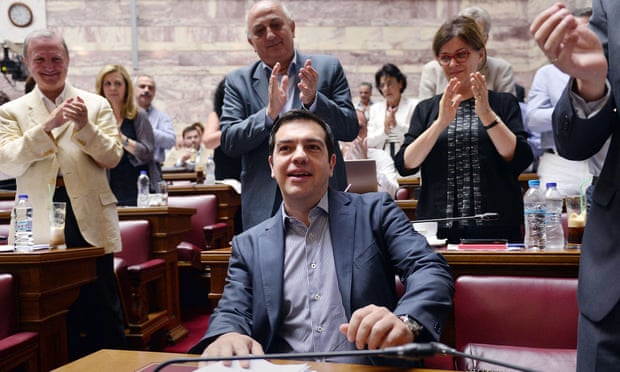Greeks
facing day of judgment in struggle to stay in eurozone
Greece
could be cut loose and plunged into financial collapse if it fails to
win over EU leaders at a weekend of summits to decide its fate

10
July, 2015, 00.05 BST
Greece
faces its day of judgment on Saturday when eurozone countries must
decide whether to open negotiations on a third multi-billion euro
bailout for the insolvent country in five years – or whether it is
cut loose and plunged into financial collapse.
A
weekend of what is billed as “last-chance” summitry is to decide
Greece’s fate after the government of Alexis Tsipras caved in to
creditor demands for further austerity measures in return for the
promise of limited debt relief. With the support of France, he tabled
13 pages of economic and tax reform pledges as the basis for talks on
a new bailout worth more than €53bn over three years.
The
Greek proposals were pored over on Friday after arriving in Brussels
and other European Union capitals late on Thursday evening. The
French president, François Hollande, described the new Greek plan as
“serious and credible” and proved the Tsipras government was
determined that Greece should stay in the eurozone.

There
was no comment from the German chancellor, Angela Merkel, but there
were conflicting signals from parties within her coalition, with some
MPs saying it was an important step forward and others saying Greece
was not to be trusted and should exit the euro.
Tsipras
told members of his own party that he had no mandate to take Greece
out of the euro and said: “We are all in this together”.
Senior
eurozone officials will grapple with the details on Saturday morning
before passing their recommendations to an extraordinary session in
Brussels of the Eurogroup, the committee of 19 eurozone finance
ministers.
The
committee’s head, Jeroen Dijsselbloem of the Netherlands, said he
expected a “major decision”.
After
five weeks of breathtaking brinkmanship involving a referendum,
marathon negotiations, countless reform and rescue blueprints, and
five months of stalemate since the radical leftist Syriza party took
office, the finance ministers have to decide whether there is a basis
for launching an attempt to strike a new deal.
EU
leaders have scheduled two extraordinary summits in Brussels on
Sunday, the first involving the 19 eurozone heads of government,
followed by those of all 28 member states including David Cameron and
leaders of other non-euro countries.
These
meetings would be cancelled, senior officials in Brussels said, if
the finance ministers decided on a green light for new bailout
negotiations with Greece.
Parliament
is debating package of tough spending cuts and tax rises proposed to
avoid Grexit. Vote due around 1am BST (3am Athens)
Read
more
“I’d
be astonished if the heads overturned a decision of the finance
ministers,” said a senior official involved in the negotiations.
That
suggests that if the Sunday summits go ahead, they will be to plan
how to cope with a Greek banking collapse and social chaos if the
Grexit happens.
“I’m
not optimistic,” said a eurozone official. “There are too many
problems, not enough time, too many people who do not believe the
Greeks will deliver their side of the bargain.”
An
EU diplomat said eurozone creditors were very fed up with “five
months of manipulation” by the Greek side and worried whether or
not Tsipras would really push through the reforms demanded by
creditors. “It doesn’t matter what they say, they will never do
it.”
Tsipras
has pirouetted this week in a way that has left the Europeans gasping
in incredulity. He broke off negotiations a fortnight ago and
announced a snap referendum on the austerity terms demanded in return
for extending the second bailout which expired on June 30.
He
campaigned for a no vote and won handsomely, backed by more than 61%,
before performing a striking U-turn on Thursday night, re-tabling the
same austerity terms he had campaigned to defeat and which the voters
rejected. The terms included VAT and pension reforms Tsipras had
previously insisted were red lines which would never be crossed.
“On
Sunday, the Greek people voted against these measures,” said
Michael Fuchs, the deputy floor-leader in Berlin Merkel’s governing
Christian Democrats. “I have a little bit of a problem trusting it
because what is the difference between Sunday and today?”
Alexis
Tsipras is applauded in the Greek parliament in Athens. Photograph:
Louisa Gouliamaki/AFP/Getty Images
Deciding
against a third bailout would leave Greece facing an unprecedented
economic crisis. With its banks closed and capital controls in place,
the financial institutions are rapidly running out of money. Without
a bailout programme, the European Central Bank could cut off the only
lifeline keeping Greece afloat: its emergency liquidity assistance to
Greek banks.
Grexit
summits on Sunday would then focus on helping Greek operations to
establish a secondary parallel currency, the half-way step to a
return to the drachma.
Tsipras
was seeking to push the proposals through the Greek parliament on
Friday evening, but his acceptance of the austerity measures demanded
by the creditors will not be enough to secure a deal because the
goalposts have moved in the two weeks since he rejected many of the
same terms.
The
negotiation has changed. What was being negotiated last month was
prolonging an existing bailout arrangement by several months. Merkel
has made plain that Greece needs to table much more ambitious and
draconian measures to qualify for a new two- to three-year bailout
worth a lot more money.
A
German finance ministry spokesman said it was too late to “repackage”
last month’s proposals and called on Tsipras to demonstrate greater
commitment to an agreement by pushing reformist legislation through
the Greek parliament immediately.
This
issue will figure strongly in Saturday’s negotiations, officials
and diplomats said, pointing particularly to the resistance to a new
deal from the newer and smaller members of the euro in eastern Europe
who, in recent months, have come out of the closet as fiscal hawks
and the loudest critics of Tsipras.
The
Slovak finance minister, Peter Kazimir, a leading hardliner, voiced
his scepticism of Athens’ promises. “How quickly can a
caterpillar turn into a butterfly?” he tweeted.
Dalia
Grybauskaite, the president of Lithuania, said: “It seems those
proposals will really not be enough.”
Her
Latvian counterpart, Laimdota Straujuma, said: “It will be very
hard for me to persuade the parliament. If you were to ask Latvians
today whether they are willing to lend money to Greece, you can
probably guess what their answer would be … At the moment, I see no
reason for Latvia to give money to Greece.”
Estonia,
Latvia, Slovakia and Slovenia take a similar view.
The
head of sovereigns at Fitch’s ratings agency, James McCormack,
predicted the talks would fail and there would be “an eventual exit
from the eurozone” for Greece.
Any
agreement that might be struck would need to be put through the
Bundestag early next week, but Greece fatigue is reaching critical
mass in Berlin.
There
was some optimism. Some bookmakersclosed their books for bets on
whether Greece would survive in the euro after an avalanche of
betting on Greece remaining in the currency following the unveiling
of Athens’ plan. The financial markets responded favourably to the
talk of a weekend agreement, strengthening the euro against the
dollar.
And
Paris, in a rare challenge to Merkel in five years of currency
travails, has staked its all on keeping Greece in the euro,
dispatching experts to help Athens to write its reform manifesto and
loudly campaigning for an agreement to rescue Greece.
From Pravda-upon-the-Thames
Greek banks to go bankrupt Monday if no debt deal – FT
10 July, 2015, 17.08 Moscow time
As
cash withdrawals from Greek banks reach €100 million a day the
country’s banking system will end up bankrupt on Monday if no deal
with creditors is reached over the weekend, some senior bank
executives told the Financial Times (FT) on Friday.
Cash
withdrawals are at a high rate despite capital controls imposed by
the Greek government. If the European Central Bank (ECB) doesn’t
agree to extend its emergency liquidity assistance (ELA) program,
customers will be left without money by Monday, according to one of
the bankers who talked to FT.
On
Thursday the head of Greece's banking association Louka Katseli said
the Greek banking system had cash guaranteed only till Monday. She
didn’t say what would happen afterwards.
Banks
in Greece have been effectively passing cash among themselves while
the pressure increased in recent days, the bankers told FT. The Bank
of Greece asked healthier banks to return some of their liquidity so
that it could be shared out to weaker ones. One of the bankers said
that they “don’t have any choice.”
Greek
banks hold about €40 billion of loan loss provisions, covering
almost 60 percent of non-performing loans, financiers say. And in the
worst case scenario they might be forced to “haircut” depositors.
The
Greek government on Wednesday prolonged capital controls and bank
closures imposed last week, till July 10. The ECB then promised to
keep the current level of its ELA to Greek banks, which is estimated
at €89 billion. It is to reexamine changing the ELA conditions on
Monday to hold off a collapse of the Greek financial system.
Talks
between Athens and Europe over the country’s reform plan and vital
bailout continue. On Thursday, Greek Prime Minister Alexis Tsipras
submitted new proposals to the creditors following a request for a
three-year loan. Eurogroup President Jeroen Dijsselbloem said the
eurozone would discuss a response to the plans on Saturday while
Germany warned there was little room for easing Greece's debt burden.
The Greek Parliament is set to vote on July 10 -11 on whether it will
stay in the euro or leave.
The
US and the IMF on Thursday have both called on European leaders to
grant Greece debt relief to prevent ‘Grexit’.
Some
European leaders have started talking about the possible Greek exit
from the eurozone and even prepared a detailed Grexit scenario.
Athens
last week failed to repay €1.6 billion to the IMF, becoming the
first developed country to default on its international obligations.
Greece
has a €3 billion payment to the European Central Bank due on July
20.
10
July, 2015
Thousands
of Greeks have once again taken to the streets in a show of
solidarity as PM Alexis Tsipras attempts to rally support in
Parliament for a deal with creditors that looks nearly identical to
the proposal the Greek people voted against last weekend.
If
all goes according to Tsipras' plan, the deal will be pushed through
at a Eurogroup meeting on Saturday in Brussels and the PM will have
officially sold out the voters who just last Sunday rallied behind
his impassioned (and perhaps disingenuous) plea for a "no"
vote.
(live
feed)
The
view from the Reich
Reforms
tabled by the Greek government in a bid to secure a third bailout
have sparked positive reactions. But observers have warned a thorough
assessment is still necessary and the proposals may not go far
enough.
If
British bookmakers are anything to go by, the chance that Athens
avoids having to leave the eurozone is constantly improving.
Bookmakers told Reuters news agency the odds of Greece's leaving the
common currency area at at 25 percent to 30 percent - the lowest they
have been this year.




No comments:
Post a Comment
Note: only a member of this blog may post a comment.